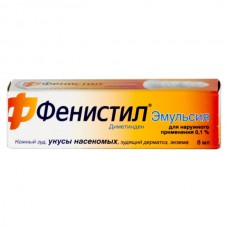Expiration date: 02/2026
International name:
Dimetindene (Dimetindene)
Group affiliation:
H1-histamine receptor blocker
Description of the active substance (INN):
Dimetindene
Dosage form:
gel for external use, drops for oral administration, capsules of prolonged action
Pharmacological action:
Blocker of H1-histamine receptors, a competitive antagonist of histamine released by mast cells are not occupied by them blocking H1-histamine receptors, therefore the most effective for preventing allergic reactions of immediate type (or gain in connection with the release of new portions of histamine). Also blocks the effects of other mediators (serotonin, bradykinin) involved in the pathogenesis of allergic reactions. Significantly reduces the increased capillary permeability. Has a weak anticholinergic and sedative effect. After intake of pill retard onset of action - 30 minutes, duration - 8-12 hours in the local application (gel) onset of action - after a few minutes, maximal effect in 2-4 h.
Indications:
Inside - allergic diseases (urticaria, angioneurotic edema, hay fever, allergic rhinitis), itching (eczema, itchy dermatitis, measles, rubella, chickenpox, insect bites, allergic reactions, serum sickness (as a subsidiary of drugs), prevention hyposensitization therapy. Local itching (itchy dermatoses, urticaria, insect bites), sunburn, domestic and industrial burns (mild).
Contraindications:
Hypersensitivity, the neonatal period (up to 1 month), especially premature, angle-closure glaucoma, prostatic hyperplasia with clinical manifestations, bronchial asthma, pregnancy (I trimester), lactation.
Side effects:
Drowsiness (especially at the beginning of treatment), dizziness, agitation, headache, nausea, dry mouth or throat, swelling, skin rashes, muscle spasm, disturbance of function of external respiration. Topically - allergic reactions, burning, dryness. Overdose. Symptoms: depression of the Central nervous system and somnolence (predominantly in adults), stimulation of the Central nervous system and antimuscarinic effects: agitation, ataxia, hallucinations, tonic-clonic convulsions, mydriasis, dry mouth, and congestion of blood to the face, urine retention, and fever (mainly in children), reducing AD, collapse. Treatment: activated charcoal, saline laxatives, drugs for maintaining the activity of cardiac and respiratory systems (analeptic drugs should not be used).
Method of application and dose:
Inside. Adults and children over 12 years - 2.5 mg (1 tablet retard) morning and evening or 4 mg (retard capsule) 1 times a day. In severe cases, 2.5 mg 3 times a day. Single dose for drops 1-2 mg (20-40 cap), the multiplicity of reception - 3 times per day. Tablets and retard capsules should be taken whole, with liquid, squeezed small amounts of water. In pediatric practice it is preferable to apply in the form of drops. Children over 3 years - 15-20 cap 3 times a day, 1-3 years - 10-15 cap 3 times a day for 1-12 months for 3-10 cap 3 times a day. Externally. Apply to the affected areas of skin 2-4 times a day. In cases of marked itching and widespread skin lesions is recommended the simultaneous use of oral forms.
Special instructions:
In children of younger age may cause stimulation in children under the age of 1 year - sedative effect, accompanied by episodes of sleep apnea. Ineffective pruritus associated with cholestasis. Drops should not be exposed to high temperature. When assigning newborns and infants drops added to the bottle with warm baby food directly before feeding. Children, the feeding of which is done with a spoon, you can give LS undiluted. Need to avoid prolonged sun exposure of skin areas treated with gel. During treatment should not engage in activities requiring increased attention and rapid response.
Interaction:
Enhances the action of anxiolytics, hypnotics. With simultaneous use of ethanol - a slowing of reactions. Tricyclic antidepressants, anticholinergic drugs increase the risk of elevated intraocular pressure. MAO inhibitors increase the anticholinergic and CNS depressant actions.


